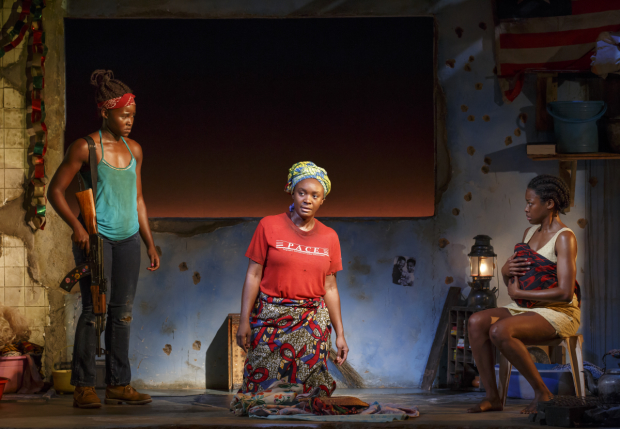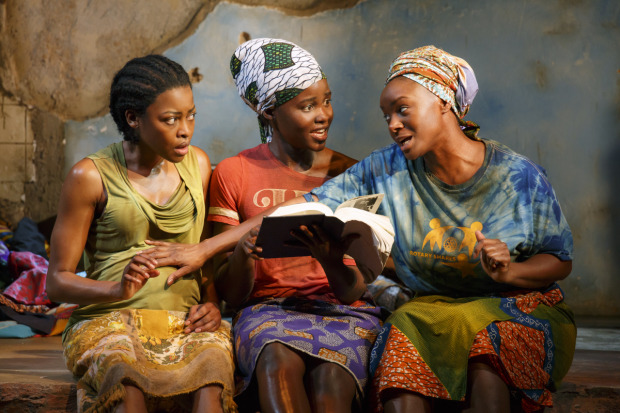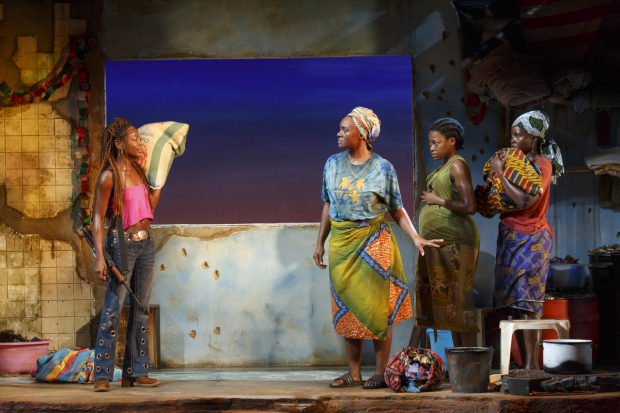
(© Joan Marcus)
"He lovin' de American gal so she say no den he go back to Zamunda," recounts a Liberian woman in the earliest moments of Danai Gurira's Eclipsed. For those without an encyclopedic knowledge of 1980s cinema, she's describing the plot to the Eddie Murphy comedy Coming to America, about an African prince who finds his queen in Queens. This wildly fanciful American take on Africa, recycled through the perspective of African women, feels like a perfect introduction to Gurira, a true playwright without borders. Responding to the end of that film, in which the prince marries the American girl, another Liberian woman remarks, "And you say he Prince wit' lot o' money. He could have been wit' poor African gal den she can help ha' family…I no like dat." This pragmatic takedown of our American happy ending is the first of many revealing moments in this powerful new drama.
Following a critically acclaimed run at the Public Theater, Eclipsed has moved uptown to the John Golden Theatre. Its arrival marks Gurira's Broadway debut as a playwright (she appeared as an actor in the 2009 revival of Joe Turner's Come and Gone). At the same time, her new comedy, Familiar, has audiences rolling in the aisles at Playwrights Horizons. Gurira seems to be having a well-deserved moment right now. Few American playwrights are as versatile and thought-provoking, as this excellent production proves that at every turn.
Set during the second Liberian Civil War, Eclipsed is the story of four women married to a commanding officer (referred to as "C.O.") of the Liberians United for Reconciliation and Democracy (or LURD) rebel army. They live in a concrete shack pocked with bullet holes (detailed yet efficient set by Clint Ramos). These sister wives refer to each other by number: Wife #1 (Saycon Sengbloh) is the oldest and has been with the C.O. since the first war. #2 (Zainab Jah) took up arms and went off to fight. #3 (Pascale Armand) is pregnant with the C.O.'s baby. #4 (Academy Award winner Lupita Nyong'o) is the youngest and still not fully reconciled with her position. She's educated (entertaining the women by reading from a worn biography of Bill Clinton) and has ambitions to run for parliament someday. We never see the C.O., but when a stark light shines into the room (subtle, effective design by Jen Schriever), the women stand at attention; we know he's there to select one of them for sex.

(© Joan Marcus)
Too many American playwrights seem content to linger on misery and Western complicity when considering the developing world, practically fetishizing the victimhood of their characters. The subject of African war brides seems to beg for similar treatment. Thankfully, Gurira refuses to traffic in such simplistic clichés. Instead, she shows the ways these women laugh, learn, fight, and persevere.
Director Liesl Tommy follows suit with a clear-eyed production: When #3 returns from her time with the C.O., she doesn't crumple into a heap or stare blankly into the mezzanine. Instead, she nonchalantly wipes her inner thigh with a wet rag and continues to throw shade. So much of Eclipsed is about the false promise of choice. When peace activist Rita (Akosua Busia), who has come to the camp to negotiate for the end of the war, asks #1 if she is happy, she responds, "No, but dis is war and whot else I gon do?" Rita suggests school, but it's hard to see this as anything other than bourgeois naiveté: Liberia's civil institutions have never served #1 and they probably won't start after two bloody civil wars.
As in Familiar, Gurira excels at creating realistic family dynamics. Portraying the baby of the group, Nyong'o astounds us by maintaining a childlike innocence, even when she starts committing unspeakable acts of violence. The little flair stickers on her Kalashnikov exemplify this unsettling meeting of juvenile whimsy and deadly force. Jah is simultaneously terrifying and alluring as #2, #4's mentor in war. She modulates her voice down, perhaps in an effort to sound more masculine and is unapologetic in her love of plunder and will to dominate.
Sengbloh endows her character with a mix of severity and love that feels appropriate for a motherly first-wife. Her palpable disappointment at giving her best years to this man and his war causes our throats to tighten. Busia is equally moving as Rita, the alleged altruist who is actually looking for her own missing daughter. She relives that loss several times over the course of the evening, but never in a way that is melodramatic. A key in this play seems to be restraint, a trait that doesn't come as naturally to Broadway.

(© Joan Marcus)
Certainly, some of the enhancements of this commercial run greatly benefit the work: Rick Sordelet and Christian Kelly-Sordelet's stage combat is far more realistic and frightening. Hair and makeup designer Cookie Jordan has augmented her work from off-Broadway, adding specific and illuminating choices: #2 sports a crest of braided hair that makes her look like a Roman legionary. All of the women shimmer with tropical perspiration, giving the play a cinematic polish.
Unfortunately, bigger isn't always better: Broken Chord's overwritten original music feels jarringly out of place during the transitions. Pitched to the back row, Armand's performance is much funnier, but it no longer feels as grounded to real stakes as it was in the smaller venue. Even the otherwise excellent Nyong'o occasionally overindulges, as when she violently shakes through the play's climax.
Still, Eclipsed is one of the best plays of the season, infinitely watchable and completely unforgettable. Gurira is the rare modern playwright who fully trusts her actors and is not afraid to mix comedy and drama in equal portions. I cannot wait to see what she comes up with next.









